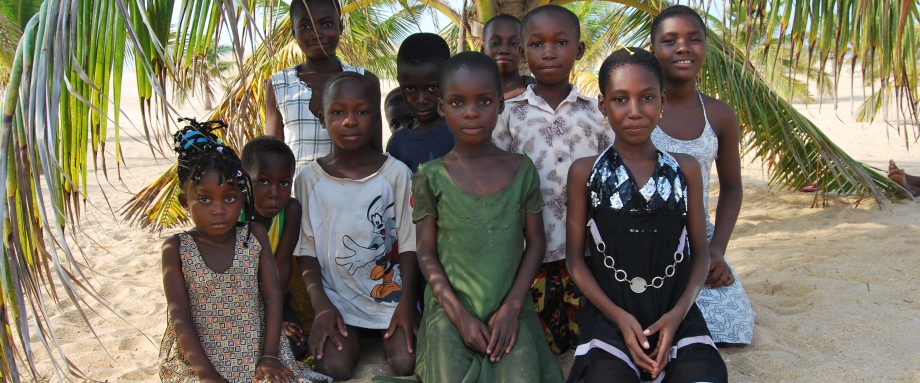Aflasco is a small fishermen community on the outskirts of Keta , a small town in the Volta Region .
There are about fifty families and every family has at least 5-6 children. These are families with an income which equal to that of the poverty line. They make a modest living by fishing, carrying out small door to door trades and they often rely on the income coming from the market days .
Parents often send their children to work for families with more opportunities to unburden a weight. It is not uncommon for these children to be forgotten by the family of origin. These are mostly “domestic partnerships” without wedlock and without a definite sense of responsibility, both in respect of the partner and children. No birth plan is in any way regarded to as important. This results in girls having children at a very young age, often with different partners. Drinking too much is common for many men and women. The level of illiteracy is very high. Even the hygienic conditions are poor and many homes lack the toilet area.
The children attend the nearby schools, but – in a context so deprived of moral and material misery – school is only seen as a mere obligation. At other times they have to work with parents and take on all the household chores: to transport of water from the well to the house, to clean and take care of younger siblings. Nobody cares much about them. These are children who have mastered the art of survival, they receive few motivation from the world around them and communicate little, both with the members of the family and the other villagers. Even at school, although English is the mandatory language, they end up talking only in the local language – the Ewe – because teachers themselves make few efforts to speak the official language of the country.
One of the main problems for the children who live in Aflasco – and in countless villages like that – is the lack of prospective for the future. The only reality they know is the isolation and deprivation of the small space they live in. Once they grow up they will most certainly perpetuate this reality. To learn English and to learn how to interact with their peers and interact with people from another continent, may help them break this habit. Language will also become a vehicle for them to get out of the narrow circle in which they live and discover new possibilities for the future.
We also hope that the successes of the children will benefit adults as well. Contrary to the popular belief, in fact, we reckon the children may become an example for their parents.
You can make the best of your holiday here by staying with them for some time, teaching English, reading books for them, listening to them, drawing with them. You can come with your own pencils, small children books, games. Otherwise you will find those materials here in the compound. Thanks to your help – just a small amount of money – we can provide them food at the end of the classes.
Alternatively you can contribute in other ways to help us carrying on the project.
We appreciate any little help.
We also run some projects in the Ashanti Region whit the Ashanti Development Charity and suppoert children coming from the Agbogbloshie slum in Accra.
Here is the Italian affiliate

Dear Sir
Excuse me for disturbing you in your busy times.
I am Mr Dietwin, living in Belgium,
and one single person alone.
I heared so much good points about your beautifull country.
I would love to visit Ghana, maybe in november.
Your lodge looks brilliant!
Sooo my question is, do you organise airport pick-ups? And what should be the price for a one-way ride from:
Busua or Kumasi to the lodge
and back from Keta to Kumasi or the airport of Accra.
Thank you sooo much for the information!
Dietwin
Thank you sooo much in advance for the information.
Dietwin
LikeLike
Dear Dietwin, please write in the space of reservation. See up and right https://wildcampghana.com/
LikeLike